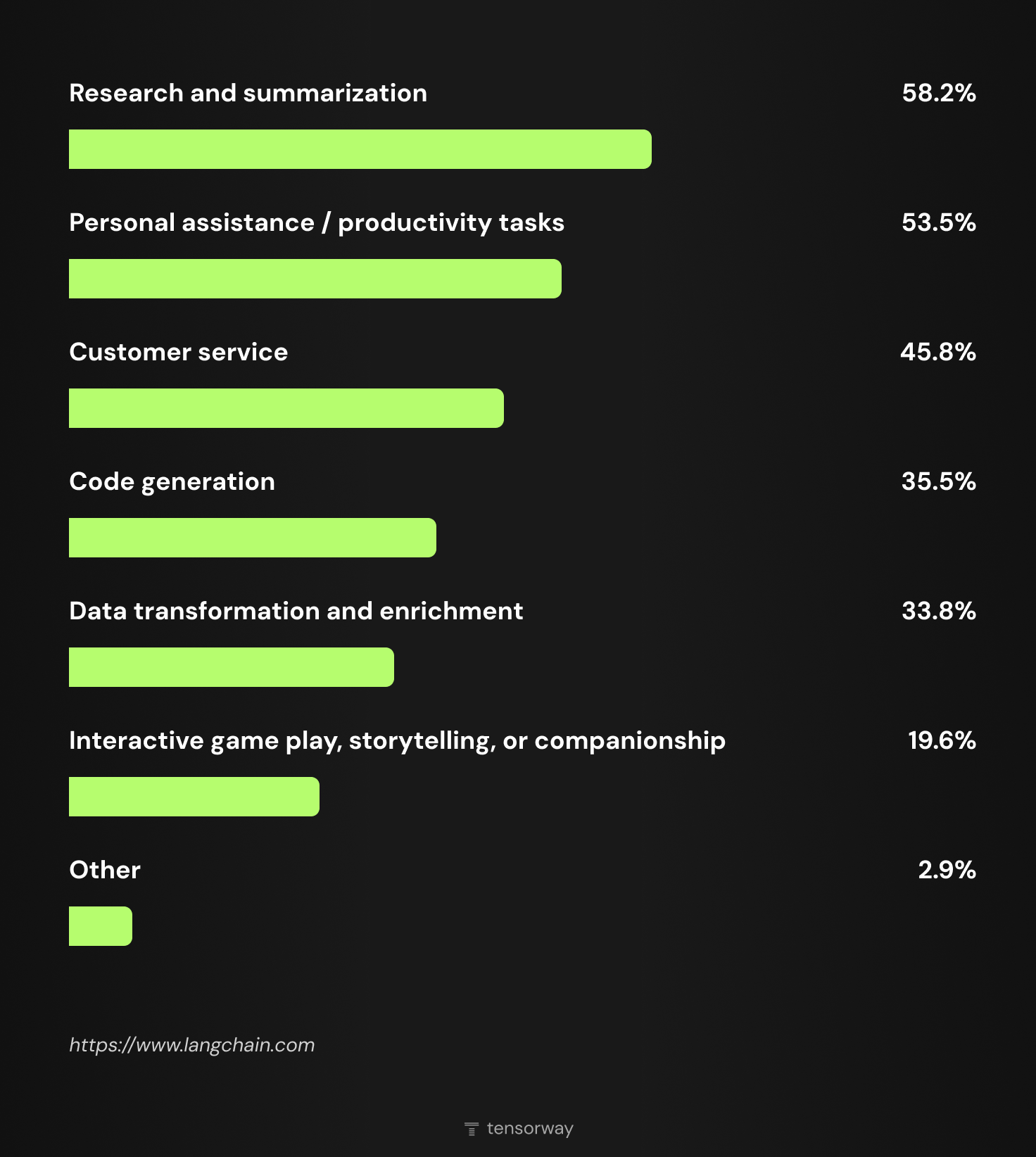In 2024, the volume of the global AI in education market hit the mark of $4.8 billion. By 2033, the market is expected to reach $75.1 billion, meaning the CAGR for the period 2025-2033 will exceed an impressive 34%. The market growth is driven by a number of factors, including the increasing demand for personalized learning experiences. And that’s exactly what the use of AI agents in education can ensure.
AI agents can be defined as software programs that are able to act autonomously in their environments, make decisions, and perform tasks to achieve a specific goal. They are powered by LLMs and can interact with other tools or systems.
According to the results of a recent survey, users believe that AI agents are the most helpful for executing research and summarization tasks as well as streamlining processes related to personal productivity or assistance.

The use of AI in education can address a lot of issues that the traditional educational system fails to solve at scale. AI agents can create highly personalized, adaptive, and real-time interactions, which are aimed at increasing the overall efficiency of all teaching and learning efforts.
In this article, we suggest taking a closer look at how AI agents in education can enhance the processes for students and tutors, as well as at the challenges of their adoption at the current moment.
AI Agents in Education: Key Features and Characteristics
What makes AI agents good solutions for the education industry?
- Autonomous functioning. Though human oversight is still recommended for safety reasons, in general, such tools can work independently.
- Adaptability and constant learning. These systems can continuously evolve and learn based on user interactions. It means that with time they can enhance their outputs and become more efficient.
- Decision-making capabilities. AI agents can process and analyze a lot of data to make well-grounded decisions in accordance with specific goals.
- Continuous availability. Such tools are accessible anytime, even outside traditional classroom hours.
- Scalability. AI agents can serve an unlimited number of students. This makes personalized learning and tutoring accessible to large groups or even entire educational systems, regardless of their location.
- Support for diverse learning needs. These systems can be designed to cater to a wide range of learning styles and needs. For example, they can offer customized support for students with disabilities, non-native language learners, or those individuals who need extra help in specific academic subjects.
- Integration with EdTech ecosystems. AI agents can be seamlessly integrated with other educational technologies. For instance, you can connect them to Learning Management Systems (LMS), virtual classrooms, and academic databases to enable a comprehensive educational experience.
If you want to learn more about the characteristics of AI agents, you can follow this link and read one of our previously published articles.
How Can You Use AI Agents in Education?
The application of AI can greatly enhance the learning experience by making education more personalized, engaging, and efficient. But how is it possible? Let’s consider the most common use cases of AI-powered agents in education.

Personalized Learning Plans
AI agents can be used to assess students’ strengths and weaknesses. This information is crucial for identifying the most appropriate learning style for each individual. Based on this, AI can create tailored learning paths. Thanks to this possibility, each student will move at their own pace and work with the content fully suited to their needs.
24/7 Intelligent AI Tutors
Teachers can’t be available to students around the clock without days off. Meanwhile, AI tutors can. Such tools provide students with constant support without pauses. Powered by Generative AI and natural language processing (NLP), they can explain concepts, answer questions, recommend learning materials, and give practice exercises anytime. As a result, students can continue learning from any place, even when classes are over.
Real-Time Feedback and Automated Grading
Traditionally, when students submit their tests or any other assignments, they need to wait for teachers to check them. This waiting time can be rather irritating. However, AI agents can address this problem by offering immediate feedback on assignments and projects. This helps students understand their mistakes and improve faster.
Apart from this, automated grading systems can save teachers time.
AI-Powered Gamified Learning
AI can be integrated into educational games. AI-powered features make learning more engaging and fun. This technology can adapt the difficulty of games based on the student’s performance. As a result, the activities stay moderately challenging and motivating.
Smart Content Creation
Generative AI in education can also be applied to create dynamic and interactive learning materials, including videos, quizzes, and exercises. Such materials can be fully tailored to the curriculum or specific learning needs.
Career Recommendations
AI agents can analyze the interests and strengths of students to suggest potential career paths and educational opportunities. Also, they can provide guidance on relevant courses and tips on the skills that should be developed for a specific career.
Language Translation and Accessibility Tools
Artificial intelligence can provide real-time language translation. It means that educational courses can become accessible to students who speak different languages.
Moreover, such tools play a crucial role in increasing the inclusivity of education. This technology can assist students with disabilities by offering text-to-speech, speech-to-text, and sign language interpretation.
Automation of Administrative Tasks
Such systems can greatly help in executing administrative tasks. They can generate progress reports and track student attendance automatically. AI agents can also assist with scheduling classes, sending reminders, and managing deadlines.
Use of AI in Education: Challenges and Ways to Address Them
As you can see, the use of AI in education is a pretty promising initiative. This technology definitely has a wide range of benefits for all the participants of the learning process. Nevertheless, its implementation is closely related to a number of pitfalls. If not addressed carefully, these challenges could impact the effectiveness and fairness of education.
However, when you stay aware of them and know how to protect your solutions and their users, all negative consequences can be minimized (or even fully eliminated).
Challenge 1. Data Privacy and Security Concerns
AI systems work with big volumes of data. When it comes to AI use in education, such tools traditionally collect vast amounts of sensitive student data, including performance metrics, personal information, and learning behaviors.
As a result, there are serious concerns about potential data misuse and leaks.
Solution
To avoid serious reputational and financial damage, educational institutions must prioritize strong data protection policies.
Here are a couple of methods and approaches that can be implemented:
- Data encryption at rest and in transit;
- Transparency about data collection and usage;
- Compliance with privacy regulations like GDPR;
- Provision of control over their data for students and their parents.
Challenge 2. Bias
The performance of Generative AI in education seriously depends on the quality of the data that models are trained on. When the training data is biased or limited, AI may provide outputs that will leave much to desire. Such outputs may unintentionally reinforce inequalities and lead to unfair treatment of certain student groups.
Solution
To avoid any unfair practices, it is necessary to rely on diverse and representative datasets during AI model training.
Moreover, even after the implementation, regular audits of AI systems for bias and fairness are a must. Another important component is human oversight. We strongly recommend you keep it to double-check AI-driven decisions (at least with some periodicity).
Challenge 3. Reduced Human Interaction
AI agents powered by Generative AI in education can handle a lot of repetitive tasks that are traditionally included in basic tutoring.
As a result, there appears to be a risk of reducing meaningful teacher-student interaction. Despite all the advantages that technologies can bring, human interaction remains critical for emotional support, motivation, and deep learning.
Moreover, in this context some teachers are preoccupied that they can lose their jobs due to AI implementation.
Solution
It is important to treat AI as a support tool. It is not a replacement for teachers. Both teachers and students should clearly understand this.
Artificial intelligence can cope with routine tasks and let educators focus more on building relationships with students and solving complex problems.
Challenge 4. Need for Training
A lot of teachers may not have the knowledge or confidence to integrate AI tools effectively into their practices. Without proper training, the full potential of AI in education might be undervalued or misapplied.
Solution
Educators should have proper information on how to use new tools in their work. Apart from the potential of artificial intelligence, they should also be aware of the ethical use of AI in education.
It can be a good idea to create support communities for teachers, as well as involve them in AI tool design to ensure they meet real classroom needs.
Challenge 5. Legacy Systems and Outdated Infrastructure
Many schools still deal with outdated infrastructure or legacy systems that aren’t compatible with modern AI technologies. This limits the implementation and effectiveness of AI-powered solutions.
Solution
Of course, the solution to this issue requires significant investments that not every school or region has.
To minimize the total amount of one-time investments, it is recommended to gradually upgrade digital infrastructure and introduce scalable solutions that will support AI integration.
If system modernization is not possible at all, it’s worth prioritizing cloud-based AI tools that can interact even with outdated infrastructures.
Final Word
AI agents are transforming the landscape of education by offering personalized real-time learning experiences and data-driven insights. Such solutions successfully adapt the learning process and educational materials to the individual needs of each student and can provide 24/7 tutoring, which is not available in traditional classrooms.
With all these possibilities, AI agents make education much more accessible and efficient for everyone. However, to unlock their full potential, it is necessary to collaborate with a reliable development team or tech provider who can help build and implement these advanced solutions.
If you are looking for such a partner, contact us! At Tensorway, we have robust expertise in working with AI solutions and will be happy to support you in building an inclusive and effective learning environment with advanced AI agents.
FAQ
What is an AI agent in education?
It is an intelligent system that interacts with students, adapts to their learning needs, and provides personalized support. It can deliver real-time feedback, adjust content difficulty, and act as a virtual tutor. All this can significantly enhance learning outcomes.
Are there any risks of implementing AI agents in education?
The key risks are related to data privacy concerns and potential bias in AI algorithms. Over-reliance on Generative AI in education may reduce human interaction, which may lead to serious difficulties in everyday communication for students. Apart from this, if not all students have equal access to AI-powered tools, the introduction of such solutions in the learning process can boost the digital divide.
How much does it cost to develop an AI agent?
The cost of such a project will depend on numerous factors. To provide accurate estimates, it is necessary to analyze the complexity of your solution, your special requirements like integrations, as well as the tech stack. The use of pre-built models and components will greatly reduce development time and your potential expenses. As a rule, the cost of such projects varies in the range from $10K-$15K to $100K and can go higher based on your needs.
Who can build an AI agent for me?
For such a project, you can partner with an AI development company or hire freelance AI developers with expertise in machine learning, natural language processing, and data analysis. It would be also great to make sure that your developers specialize in building solutions for education and have deep domain knowledge.



